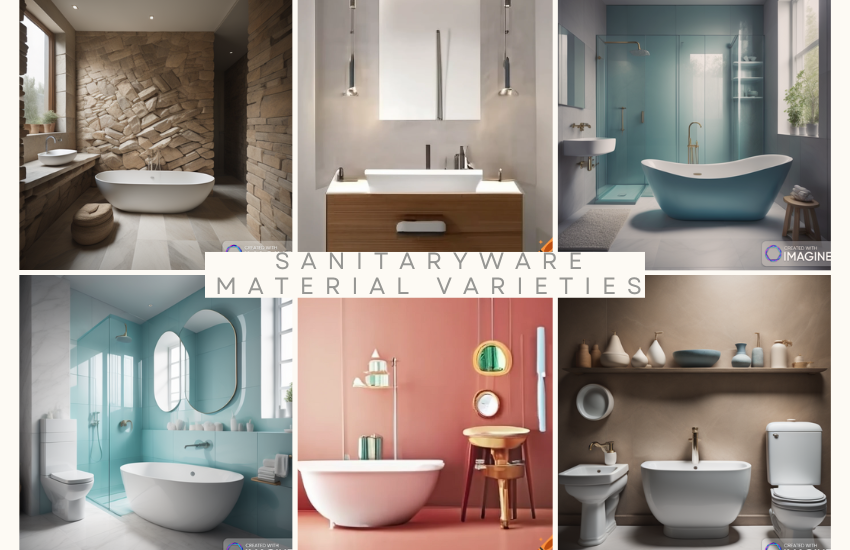Sanitaryware Material Varieties
Sanitaryware Material Varieties: When it comes to designing bathrooms and sanitary spaces, the materials used play an important role in defining both functionality and aesthetics.
They including toilets, sinks, bidets and bathtubs are manufactured using diverse materials, each offering unique qualities and characteristics.
Ceramic: The Common Choice
It remains the cornerstone in sanitaryware manufacturing and has always been known for its durability, ease of maintenance, and resistance to stains and chemicals, ceramic is extensively used for toilets, sinks and bidets.
Porcelain: A Refined Alternative
Porcelain is similar to ceramic but is more refined. Its smoother and non-porous surface makes it a popular choice. Its smoother and non-porous surface often chosen, making it a common selection for high-quality sanitary ware that offers an elegant appearance and improved resistance to stains and scratches compared to standard ceramic.
Stainless Steel: Durability and Utility
They commonly used in urinals, wash basins, and sinks, it boasts remarkable corrosion resistance, making it an ideal choice for high-moisture environments. Its sleek appearance, coupled with hygienic properties and ease of maintenance, renders stainless steel an excellent option for both commercial and residential spaces
Acrylic: Lightweight and Versatile
It is preferred for manufacturing bathtub and shower trays due to its lightweight nature and versatility. It’s easy installation, insulation properties, and ability to be molded into various shapes make it a popular choice for creating modern and sleek bathroom fixtures.
Glass: Aesthetic with Maintenance Considerations
Certain specialized basins or sinks are thoughtfully crafted from glass to provide a contemporary and elegant aesthetic, adding a touch of sophistication to the surroundings. However, glass sanitaryware requires more maintenance due to its susceptibility to scratches and stains, making it more suitable for spaces with lower usage.
Natural Stone: Luxurious and Durable
Luxury finds its place in natural stone sanitaryware, crafted from materials like marble, granite, or onyx. Used for high-end sinks, basins, or countertops, these materials offer opulence and durability, though they may require specialized care to maintain their pristine appearance.
Each material used in sanitaryware manufacturing brings forth its own set of attributes, influencing both the functionality and visual appeal of the fixture.
Why is choosing the right material important?
Selecting the ideal material for sanitaryware largely depends on several factors:
-
- Durability: Consider the expected lifespan and wear and tear in the intended space
-
- Maintenance: Evaluate the ease of cleaning and the level of maintenance required for each material.
-
- Aesthetics: Match the material’s appearance with the desired design and ambience of the space.
-
- Budget: Different materials come with varying costs, so align the choice with the allocated budget.
Conclusion: Sanitaryware: Material Varieties
The diversity of materials used in manufacturing sanitaryware offers an array of options to suit various preferences, needs, and budgets. From the durability of ceramic to the opulence of natural stone, each material brings its unique charm to the bathroom design. Careful consideration of material properties and individual requirements ensures the creation of functional and visually appealing Conor sanitary spaces
FAQs:
Which material is most commonly used in sanitaryware?
Due to its durability, ease of maintenance, and resistance to stains and chemicals, people widely use ceramic for toilets, sinks.
Is glass a common material for sanitaryware?
Acrylic is lightweight, versatile, and easily moulded into various shapes. People prefer it for bathtubs and shower trays because of its easy installation, insulating properties, and modern appearance.
Is glass a common material for sanitaryware?
Certain specialized basins or sinks use glass to offer a contemporary and elegant aesthetic. However, it requires more maintenance due to its susceptibility to scratches and stains.
How do I select the right material for my sanitaryware?
Consider factors such as durability, maintenance requirements, aesthetics, and budget when choosing the material for your sanitary fixtures. Evaluate how each material aligns with your preferences and needs








